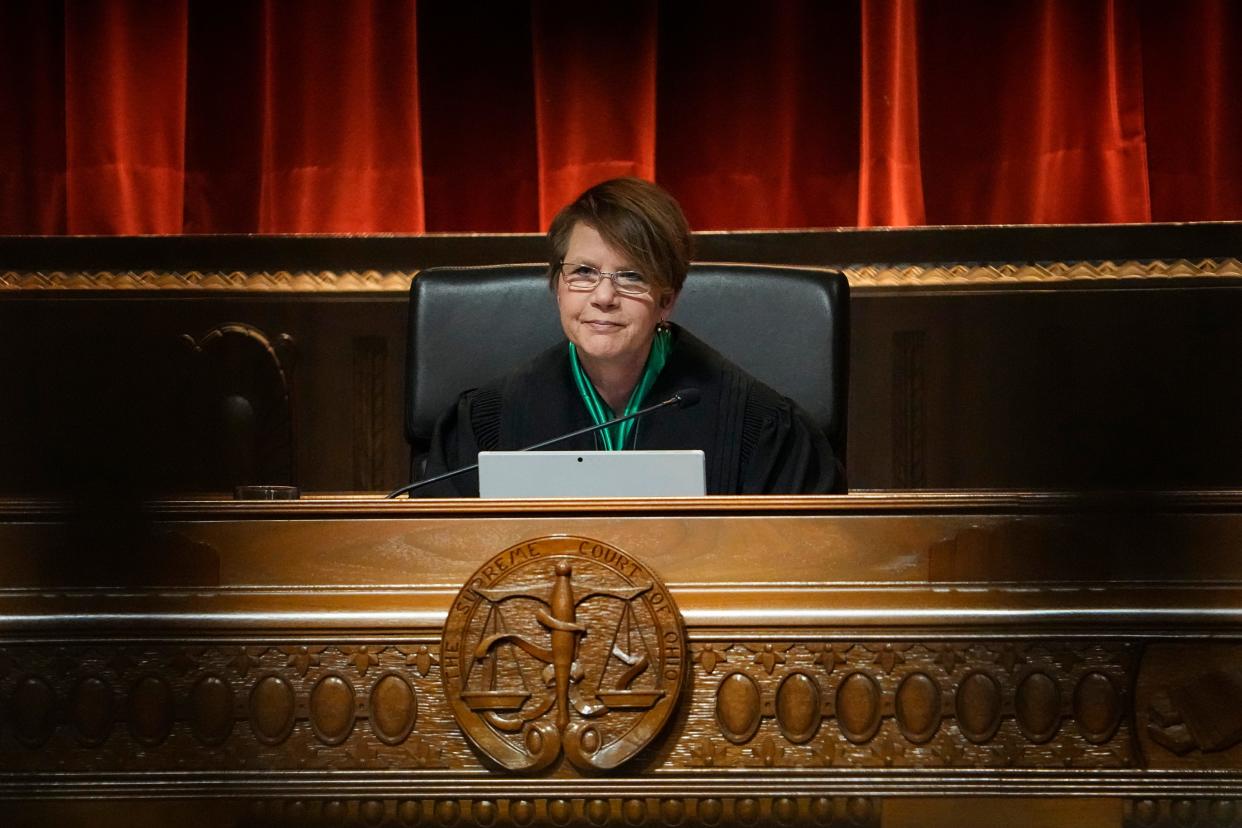Ohio abortion rights advocates sue over ballot language

The group pushing to enshrine abortion access in the Ohio Constitution filed a lawsuit Monday, challenging ballot language written by Republicans that reproductive rights advocates say is inaccurate and will confuse voters this fall.
Ohioans United for Reproductive Rights asked the Ohio Supreme Court to use the same ballot language that they used to circulate petitions and collect signatures. If the court disagrees with that approach, advocates want "blatant inaccuracies" in the language fixed.
The court, which includes four Republican and three Democratic justices, will work quickly to review the dispute because voting begins next month for those in the military or overseas. Early voting for all Ohio voters starts Oct. 11.
Republicans on the Ohio Ballot Board, a five-member body tasked with crafting ballot language, contend that their wording for Ohio Issue 1 is a fair and accurate representation of what the constitutional amendment would do. The language emphasizes the doctor's role in determining when and if an abortion is performed − echoing abortion opponents' concerns that the measure has no real limits on the procedure.
Last week, Democrats on the board tried to replace this language with the words abortion rights proponents used to circulate petitions. But that motion was defeated along party lines.
“Issue 1 was clearly written to protect Ohioans’ right to make our own personal health care decisions about contraception, pregnancy and abortion, free from government interference," Ohioans United for Reproductive Rights spokesperson Lauren Blauvelt said. "The summary that was adopted by the Ballot Board is intentionally misleading and fails to meet the standards required by Ohio law."
There are several differences between the petition language and what Republicans on the Ohio Ballot Board approved Thursday:
Republicans emphasize "abortion" in their language, listing it seven times compared to three references in the abortion rights advocates' summary.
The amendment's summary references several reproductive rights, including access to contraception, fertility treatment, miscarriage care and continuing a pregnancy. Republicans' language singles out abortion and groups the rest together as "reproductive medical treatment."
The amendment's summary uses the term "pregnant patient" and Republicans use "pregnant woman."
Republicans use "unborn child" while the amendment uses "fetus."
Republicans' language says the "citizens of the state of Ohio" can prohibit an abortion under certain circumstances. The amendment says the "state of Ohio," a reference to lawmakers, prosecutors or other state officials.
Reproductive Rights Propose... by Jessie Balmert
"Secretary (of State Frank) LaRose’s proposed language misrepresented many aspects of the amendment in an improper attempt to persuade voters to vote against it," attorneys for the abortion rights measure wrote. LaRose, a Republican running for U.S. Senate in 2024, leads the Ohio Ballot Board.
Ohio Right to Life President Mike Gonidakis said he expects the Ohio Supreme Court will reject this lawsuit.
"The ballot board got it right with a scientifically accurate depiction of the abortion industry’s ballot language," Gonidakis said. "Planned Parenthood is obviously worried that Ohioans are realizing that the language is dangerous and a bridge too far for even pro-choice women."
Earlier this year, the Ohio Supreme Court ordered the Ohio Ballot Board to rework some language on a different amendment that would have made it harder to change the state constitution.
The Ohio Supreme Court has also issued a few rulings on cases related to abortion since the U.S. Supreme Court overturned Roe v. Wade in 2022, sending the issue back to the states.
The court declined an early request to block the state's ban on most abortions that took effect the day of the U.S. Supreme Court decision. It later agreed to review a lawsuit about that abortion ban, focusing on whether abortion clinics have the right to sue on behalf of patients rather than the underlying question of whether Ohio has a constitutional right to abortion. That case has oral arguments set for Sept. 27.
Lawsuit filed challenging GOP ballot language for abortion rights measure by Jessie Balmert on Scribd
Jessie Balmert is a reporter for the USA TODAY Network Ohio Bureau, which serves the Columbus Dispatch, Cincinnati Enquirer, Akron Beacon Journal and 18 other affiliated news organizations across Ohio.
Get more political analysis by listening to the Ohio Politics Explained podcast
This article originally appeared on Cincinnati Enquirer: Ohio abortion rights advocatess sue over ballot language

